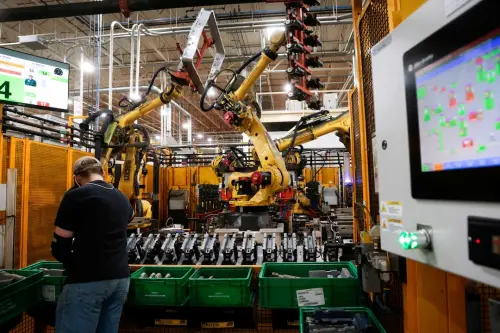Walking through a Michigan plant past whirring robotic arms and flying sparks, Swamy Kotagiri, the CEO of Canada-based auto supplier Magna, reflected on efforts to "control the uncontrollable" amid industry-shaking tariffs.
"We've had a series of black-swan events," Kotagiri noted, emphasizing that the industry thrives on certainty, cadence, and stability, elements that have been lacking over the past four years.
The vastness of Magna's facility in Michigan highlights its crucial role in the global auto supply chain. The company operates 59 facilities in the United States, 50 in Canada, and 33 in Mexico, a legacy of the North American Free Trade Agreement that fostered a highly interconnected system of part exchanges across borders for vehicle production in major markets.
However, Kotagiri and other auto industry leaders now confront significant upheaval. President Trump's 25% tariffs on foreign auto imports are anticipated to increase consumer prices, depress demand, and hinder job growth. Magna, with over 170,000 employees across 28 countries, is considerably larger than many of its clients, including Ford, General Motors, and Toyota.
Just hours before the announcement of the tariffs, Kotagiri indicated that there is no easy way to absorb these costs, predicting that much of the burden will fall on consumers. Analysts suggest that these levies could add thousands of dollars to the cost of each vehicle, as well as billions for automakers and suppliers.
Magna has already navigated challenges such as union strikes, a semiconductor shortage, and lower-than-expected demand for electric vehicles (EVs). In response to the tariffs, Kotagiri emphasized the need for flexibility, particularly at the EV structures facility in St. Clair, Michigan, which produces battery enclosures for models like GM's Hummer and Silverado EV. The company can reprogram robotic arms to assemble frames or engine cradles if necessary.
"The world changed," Kotagiri remarked. "Flexibility is key. We need to have the footprint, the capacity, and the expertise to help."
The success of Magna may also hinge on smaller suppliers, who might be even more severely impacted. Laurie Harbour, who leads a team focused on automotive suppliers at advisory firm Wipfli, noted, "If you talk to small and mid-sized suppliers that support a company like Magna, there's a feeling of panic. Their costs have skyrocketed while revenues remain soft, putting pressure on their business viability."
Large companies like Magna must also monitor the locations of their products and the frequency with which they cross borders. Surprisingly, some suppliers lack complete visibility into this process, according to Harbour.
With the potential for increased demand for Magna's U.S. operations as automakers shift production stateside to dodge tariffs, last month saw Hyundai announce a $21 billion investment in the United States, while supplier Lear indicated potential expansions. Conversely, S&P Global Mobility estimates that rising vehicle costs could dampen U.S. sales, leading to a reduction of over one million annual vehicle deliveries from the current total of 16 million.
For future growth, Magna is setting its sights on China, the world's largest car market. The company’s operations there generated 13% of overall revenue, with 69 manufacturing facilities employing over 30,000 people.
When Chinese businesses consider exporting or expanding into Europe and other global markets, "we believe we have a seat at the table," Kotagiri affirmed.
